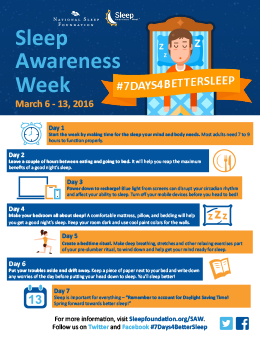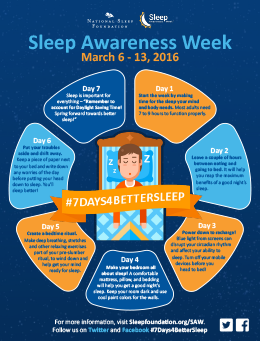Make Time for Sleep
Sleep Awareness Week, March 6th through March 13th, raises awareness about the health benefits of sleep and its importance to safety and productivity. Sleep is more than a "time out" from our busy routines' it is essential for good health, mental and emotional functioning and safety.

Prioritize your sleep and adjust your routines in advance of Daylight Savings Time.
To get some answers on the sleep questions that have been keeping me up at night, I interviewed W. Jenny Kwong, MS, RRT, RPSGT, RST, the Sleep Center Manager of the Stormont-Vail Sleep Center.
How many hours should the average person sleep per night?
7 to 8 hours for average adults.
What role does sleep play in preventive healthcare?
Sleep problems such as sleep apnea is strongly related to hypertension, heart attack and stroke. By getting sleep apnea treated, it may improve one’s future metabolic and cardiovascular health, or potentially help prevent these medical problems in the future.
How do I know if I may have a sleep disorder?
If you have people complain that you snore, or they witness that you have pauses in your breathing while you sleep, you wake yourself up gasping for air or snorting, or you experience twitchy legs, or feel excessively tired during the day and falling asleep at inappropriate times (meeting, driving, working, reading, or eating).
How do I know if I’m sleep deprived?
It is important to realize that sleep deprivation is very often due to unrecognized sleep disorders. After a typical night's sleep, you may not feel restored and refreshed and be sleepy during the day, but be totally unaware that you are sleep-deprived or have a sleep disorder. Chronic sleep deprivation may be causes for poor quality of life, decreased performance and alertness, memory and cognitive impairment, automobile accidents and occupational injury.
Should consumers who recognize these symptoms in themselves contact the Sleep Center directly with questions or should they be referred by their primary care physician?
Visiting with their primary care physicians will be the first step. The visit allows their providers to perform a full sleep evaluation, and determine if a sleep study or a sleep consult with our sleep specialist is necessary.
 What are some of the biggest myths that people have about sleep?
What are some of the biggest myths that people have about sleep?
- MYTH: Drinking caffeine all day and all night does not affect my sleep. Caffeine causes frequent awakenings such as micro-arousals during the night and disrupt your sleep. One should avoid caffeine within six hours of bedtime.
- MYTH: Drinking alcohol at bedtime helps me relax and sleep better. Drinking alcohol at bedtime can relax you and help you get to sleep. However, it will continue to relax you as you are sleeping, causing more frequent snoring and worsening sleep apnea.
What are the top things that sleep professionals wish more people knew about sleep?
- Making sleep a priority. Most people are not aware of the importance of getting enough sleep.
- People with sleep-related breathing disorders are more likely to have hypertension, and at high risk of heart disease and stroke.
If a person were going to make three changes to improve their sleep, what do you recommend?
- Maintain a regular sleep schedule and spend an adequate amount of time in bed (7 to 8 hours).
- Avoid caffeine within six hours before bed.
- Exercise regularly to maintain or attain a normal weight. Confine vigorous activity to at least six hours before bed and mild exercise to four hours before bed.
- Eliminate clock watching in the middle of the night as it can wake up your brain, making it harder for you to fall back to sleep.
What are some recommended online resources for learning more about healthy sleep?
- MedlinePlus Health Topics: Sleep Disorders
- MedlinePlus Health Topics: Sleep Apnea
- The Importance of Sleep - NIH MedlinePlus the magazine, Summer 2012 Issue: Volume 7 Number 2 Page 17












